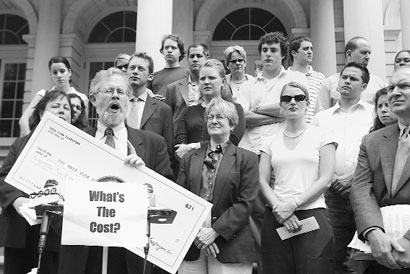By Albert Amateau
Opponents of the proposed West Side stadium charged last week that the tax-paying public would really be subsidizing the $800 million that the New York Jets intend to invest in the project.
The coalition of community groups and elected officials fighting the stadium held a July 15 news conference on the City Hall steps to denounce the possibility that $600 million of the Jets’ investment would be financed by tax-exempt bonds to be repaid out of revenue from the stadium, including funds the Jets would otherwise pay to the state.
“It’s like the Jets’ taking the money out of their rent check to repay their loans,” said Assemblymember Richard Gottfried. “That’s what we know so far. Every day there are more disclosures. It’s time for the governor, the mayor and the Jets to come clean with the taxpayers about how they intend to pay for the stadium,” Gottfried added.
“This entire project is a bait-and-switch operation against the taxpayers of New York City,” said Assemblymember Deborah Glick.
The Jets and the Empire State Development Corp., the state agency sponsoring the proposed New York Sports and Convention Center, replied last week that the financing method was only one possibility proposed by the banks in charge of stadium financing and was not final.
E.S.D.C. earlier this spring selected Citigroup and Lehman Bros. to handle stadium financing and the banks proposed the tax-exempt bonds backed by stadium revenue as a potential method. Jay Cross, Jets president, said in a statement last week that the team did not ask for the tax-exempt financing and would accept any decision by E.S.D.C.
Chapin Faye, spokesperson for E.S.D.C., said the city and the state are seeking financing that would guarantee completion of the project. “To the extent that it is permitted by law and makes economic sense, [the financing method] is a tool open to evaluation,” he said.
In reply to Cross’s statement on the stadium financing, Gottfried said, “I’d call on the Jets to join us in asking the governor and the mayor to cancel that plan.”
Among the stadium opponents at City Hall last week were Harvey Epstein and Anna Levin, members of the Hell’s Kitchen/Hudson Yards Alliance. Epstein, a member of Community Board 3, which covers the Lower East Side, is also executive director of Housing Conservation Coordinators, a West Side housing advocacy group. “This [stadium] is a really bad deal that just got worse. We need housing and job opportunities and this deal doesn’t give it to us,” Epstein said.
The state and the city propose to pay $600 million for construction of a deck over the rail yards between 30th and 34th Sts. on which the stadium would be built and for a retractable dome to allow the stadium to be used for Javits Convention Center events. The Jets’ investment of $800 million has been described as the largest single private stadium investment in the nation to date.
Councilmembers Christine Quinn and Gail Brewer, State Senator Tom Duane and Congressmember Jerrold Nadler are also opposed to the stadium.
The Regional Plan Association on Mon. July 19 issued a report on the city’s Hudson Yards redevelopment plan that was critical of the proposed stadium. Noting that the rail yards are owned by the state Metropolitan Transportation Authority, the report called for the M.T.A. to receive fair-value development above the yards.
The R.P.A. also questioned whether the stadium would serve as a viable convention center space and suggested that the stadium would deter rather than attract development in the Hudson Yards district. The report urged that a master plan for the rail yards emphasize mixed-use development, open space and access to the Hudson River waterfront.
Both Gottfried and the Hell’s Kitchen/ Hudson Yards Alliance on Monday praised the R.P.A. report and agreed with its conclusions.
For More: https://www.amny.com/news/fahrenheit-asks-the-right-questions/





































